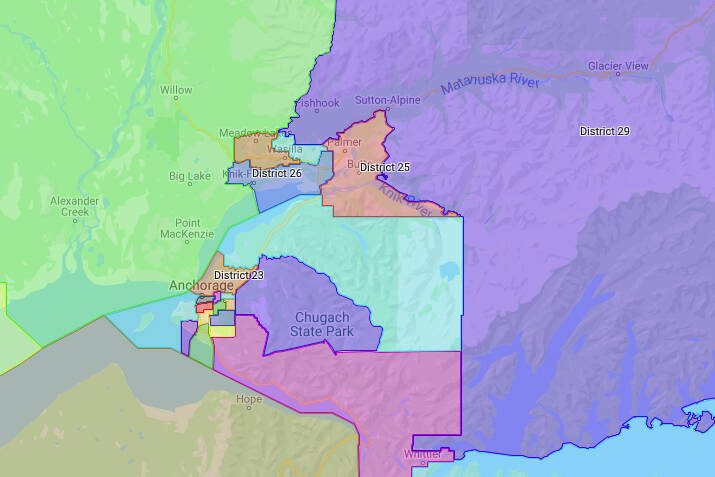By Becky Bohrer
Associated Press
JUNEAU — A divided Alaska Redistricting Board voted Tuesday on House district pairings for Senate seats for the Anchorage area that one member said would leave open the board to “an unfortunate and very easily winnable argument of partisan gerrymandering.”
Board member Nicole Borromeo said she opposed pairing House District 18, part of Anchorage’s Muldoon area, with House District 24, an Eagle River district, which she said would leave the board open to a gerrymandering argument.
She requested the five-member reconsider its 3-2 vote to finalize Senate pairings for the Anchorage area, which included plans to split the conservative Eagle River area into two Senate seats. The board, 3-2, voted against reconsidering.
The board is charged with rewriting Alaska’s political boundaries following the U.S. census, conducted every 10 years. The board aims to finish its work by Wednesday. The overall plan, once finalized, can be challenged in court.
Tuesday’s actions followed pointed exchanges on proposed maps for the area Monday and extended executive sessions.
Board member Melanie Bahnke had proposed pairing two Eagle River-area House districts to make a Senate seat and pairing two House districts that comprise the Muldoon area for a Senate seat. Member Bethany Marcum proposed pairing an Eagle River House district with an Anchorage district that includes a military base and another Eagle River district with one of the Muldoon districts.
Marcum had argued there were strong ties between the base and Eagle River and socioeconomic ties between Muldoon and Eagle River.
Voting with Marcum Tuesday were members Budd Simpson and John Binkley. Marcum and Simpson were appointed to the board last year by Republican Gov. Mike Dunleavy. Binkley was appointed by then-Senate President Cathy Giessel, a Republican.
Borromeo was appointed by then-House Speaker Bryce Edgmon, an independent, and Bahnke by then-Alaska Supreme Court Chief Justice Joel Bolger.
Borromeo said Tuesday she did not believe that the arguments Marcum had made and “the sound, sound legal advice that we got from counsel in executive session supports this pairing” of House Districts 18 and 24.
“It defies logic that we would do a minority reach-in to south Muldoon and pair it with a very white district 8 miles away on highway that crosses one mountain range and expect the court to believe with any satisfaction that we have satisfied the public trust in the process,” she said.
Binkley later cautioned Borromeo against attacking Marcum as Borromeo sought to continue what she was saying.
“Be careful, please,” Binkley told Borromeo during a tense exchange.
“I am being careful, and you know what? She should have been careful when she exposed this board to liability yesterday,” Borromeo said.
Marcum did not get involved in the discussion, which took place as the board was meeting in Anchorage.
Bahnke, in remarks, described what transpired as a surprise. “I thought that we had achieved consensus. I will accept the outcome, for now,” she said.
She said the pairings she had proposed “eliminated questions around dilutions of minority voters’ ability to elect somebody into office.” She said the board’s actions would have the effect of stifling the voices of voters in the Muldoon area, which she described as racially diverse.
Eagle River currently has one senator, Republican Lora Reinbold.

